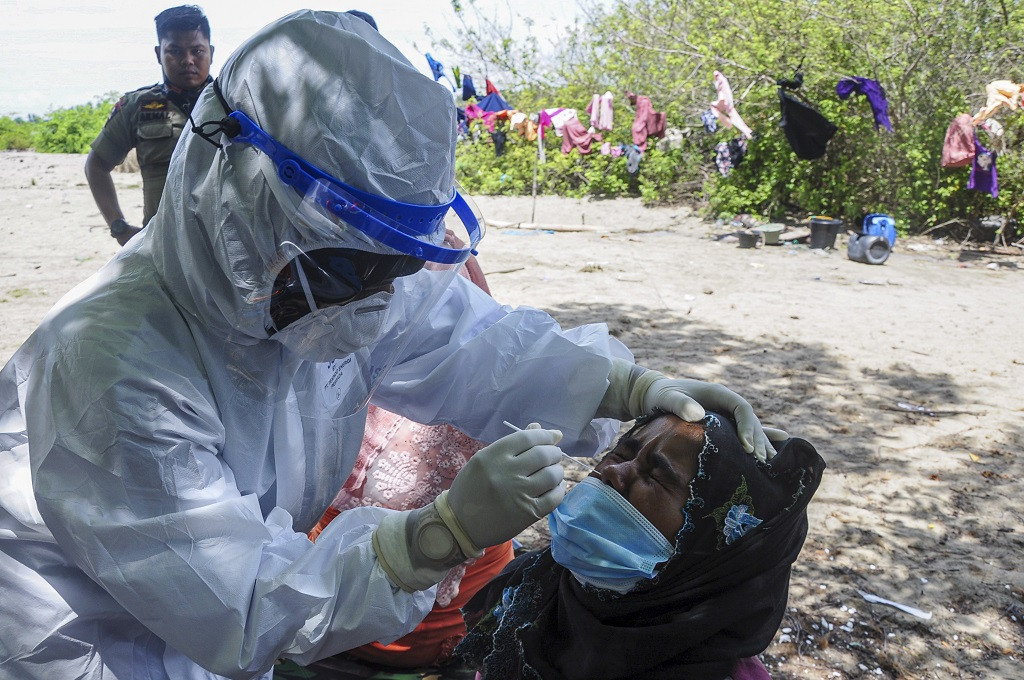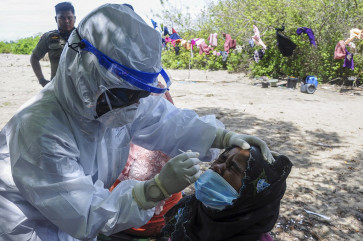Systemic exclusion leaves refugees vulnerable to COVID-19
While refugees are, in principle, included as part of the government's COVID-19 response, their legal status – or lack thereof – remains an obstacle to accessing public health services, particularly the national vaccination program.
Change Size
 A health worker from the East Aceh Health Agency stores a COVID-19 antigen swab sample, taken from a Rohingya refugee at a shelter on Idaman Island, Simpang Ulim district, Aceh, on June 9, 2021. According to the UN Refugee Agency (UNHCR), Indonesia currently hosts around 13,200 refugees, including 3,000 children, who remain outside the government's COVID-19 health and safety schemes. (Antara/Hayaturrahmah)
A health worker from the East Aceh Health Agency stores a COVID-19 antigen swab sample, taken from a Rohingya refugee at a shelter on Idaman Island, Simpang Ulim district, Aceh, on June 9, 2021. According to the UN Refugee Agency (UNHCR), Indonesia currently hosts around 13,200 refugees, including 3,000 children, who remain outside the government's COVID-19 health and safety schemes. (Antara/Hayaturrahmah)
M
ohd. Rohim, a 32-year-old asylum seeker from Myanmar who has been in Indonesia for a decade, says he has never worn a face mask during his interaction with the more than 100 asylum seekers and refugees who live together at the Hotel Pelangi shelter in Medan, North Sumatra. And because of how the Indonesian system is set up, he is among the thousands of refugees in the country who find themselves at the very back of the vaccination queue.
A little over 19 months into the global pandemic, Rohim said he was fully aware of the risks of ignoring the health protocols, even as it became known that seven people at his shelter had contracted the virus. One of the seven died in July after being treated for the disease.
“I haven’t been vaccinated and I know it is very risky, but we [can only] gather here without keeping safe distance or wearing a mask,” he told The Jakarta Post on Thursday at the shelter in Medan.
As the nation slowly gets the pandemic under control and expands immunization coverage, the International Organization for Migration (IOM) has moved to provide some means of protection from the coronavirus for the many foreign migrants still stuck in the country without clarity over their refugee or application status.
Read also: Rohingya refugee dies of COVID-19 amid lack of access to vaccines
Without any binding protections or guarantees from the Indonesian government as they wait for their cases to be processed, often for years at a time, asylum seekers and refugees are among the groups most vulnerable to contracting or spreading COVID-19.
Rohim was cautiously optimistic when the IOM promised that the people at his shelter would finally get their turn at being vaccinated starting on Sunday, even though only a small supply of COVID-19 vaccines had been made available for them.

















